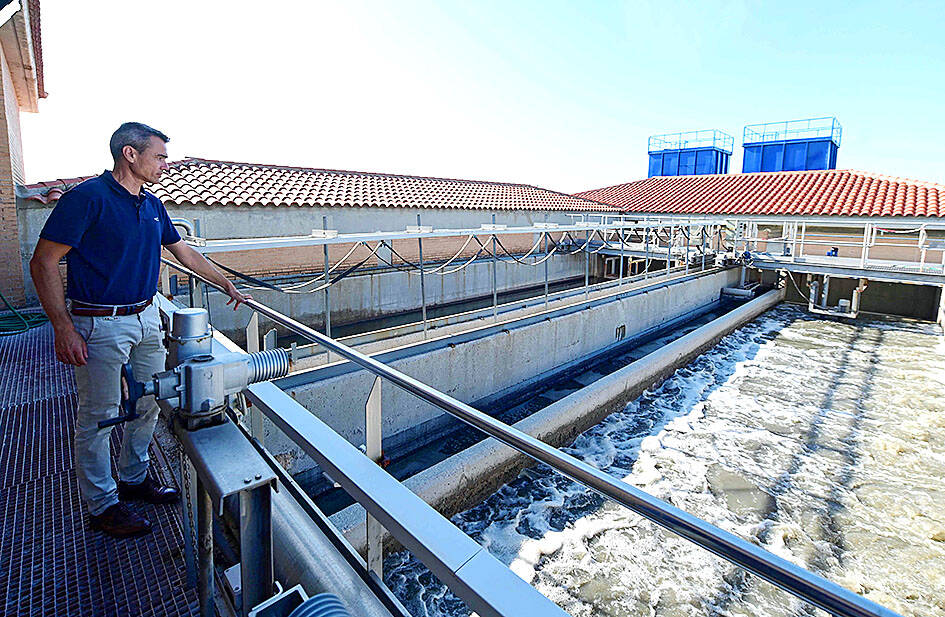With rainfall increasingly scarce, irrigating crops can be a major challenge, but farmers in southeastern Spain have long relied on recycled wastewater in a model that is winning attention abroad.
“Here the water is still dirty ... but by the end, it will be crystal clear and bacteria-free,” said Carlos Lardin, operations manager at Esamur, the public body overseeing wastewater management in the Murcia region.
At his feet, brownish water bubbled in a desilting tank, the first step before being sifted, filtered and then biologically treated to give it “a second life,” the 45-year-old engineer said.

Photo: AFP
Twenty-three years ago, Murcia — an arid region with chronic water shortages that claims to be the EU’s leading producer of fruit and vegetables — set itself a huge challenge of reusing wastewater to irrigate its crops.
To that end, the region built a network of 100 treatment plants that process and disinfect water from the sewage system so it can be reused on the fields.
This treatment, which involves sand filters and ultraviolet rays, ensures that the water “is not contaminated” and does not transfer bacteria “such as E coli” to the fruit and vegetables, Lardin said.
As a result, about 98 percent of the region’s wastewater is reused today, compared with an average of 9 percent across Spain and 5 percent across the EU, government data show.
It is an important contribution given that the central government has recently restricted Murcia’s huge water transfers from the Tagus River, whose levels have been dropping dangerously.
Esamur said that 15 percent of the region’s irrigation needs are met by recycled wastewater.
It is not enough to cover the need, but it is still important, said Feliciano Guillen, head of the Ceuti irrigation organization, which allocates water resources among farmers in northeastern Murcia.
Farmer Jose Penalver, who owns 10 hectares of land in the hills above Campos del Rio, agreed.
“Whatever [water] can be collected is good wherever it comes from as long as it’s put to good use,” the 52-year-old apricot grower said.
In his fields, an automated drip-irrigation system lets him limit water use to what is strictly necessary, in this case, two hours per day.
“Without this [recycled] water, everything here would dry up,” he said. “Every drop counts.”
Evidence of this growing interest has been seen in Murcia, where in the past few months, “many foreign delegations have come to see our facilities,” Lardin said, pointing to visitors from as far afield as Argentina and Bolivia.

Kehinde Sanni spends his days smoothing out dents and repainting scratched bumpers in a modest autobody shop in Lagos. He has never left Nigeria, yet he speaks glowingly of Burkina Faso military leader Ibrahim Traore. “Nigeria needs someone like Ibrahim Traore of Burkina Faso. He is doing well for his country,” Sanni said. His admiration is shaped by a steady stream of viral videos, memes and social media posts — many misleading or outright false — portraying Traore as a fearless reformer who defied Western powers and reclaimed his country’s dignity. The Burkinabe strongman swept into power following a coup in September 2022

‘FRAGMENTING’: British politics have for a long time been dominated by the Labor Party and the Tories, but polls suggest that Reform now poses a significant challenge Hard-right upstarts Reform UK snatched a parliamentary seat from British Prime Minister Keir Starmer’s Labor Party yesterday in local elections that dealt a blow to the UK’s two establishment parties. Reform, led by anti-immigrant firebrand Nigel Farage, won the by-election in Runcorn and Helsby in northwest England by just six votes, as it picked up gains in other localities, including one mayoralty. The group’s strong showing continues momentum it built up at last year’s general election and appears to confirm a trend that the UK is entering an era of multi-party politics. “For the movement, for the party it’s a very, very big

ENTERTAINMENT: Rio officials have a history of organizing massive concerts on Copacabana Beach, with Madonna’s show drawing about 1.6 million fans last year Lady Gaga on Saturday night gave a free concert in front of 2 million fans who poured onto Copacabana Beach in Rio de Janeiro for the biggest show of her career. “Tonight, we’re making history... Thank you for making history with me,” Lady Gaga told a screaming crowd. The Mother Monster, as she is known, started the show at about 10:10pm local time with her 2011 song Bloody Mary. Cries of joy rose from the tightly packed fans who sang and danced shoulder-to-shoulder on the vast stretch of sand. Concert organizers said 2.1 million people attended the show. Lady Gaga

SUPPORT: The Australian prime minister promised to back Kyiv against Russia’s invasion, saying: ‘That’s my government’s position. It was yesterday. It still is’ Left-leaning Australian Prime Minister Anthony Albanese yesterday basked in his landslide election win, promising a “disciplined, orderly” government to confront cost-of-living pain and tariff turmoil. People clapped as the 62-year-old and his fiancee, Jodie Haydon, who visited his old inner Sydney haunt, Cafe Italia, surrounded by a crowd of jostling photographers and journalists. Albanese’s Labor Party is on course to win at least 83 seats in the 150-member parliament, partial results showed. Opposition leader Peter Dutton’s conservative Liberal-National coalition had just 38 seats, and other parties 12. Another 17 seats were still in doubt. “We will be a disciplined, orderly